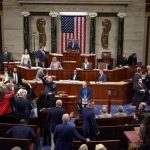So, the British Government is entirely corrupt. What happens next?
Last week, the Russian envoy to the Organisation for the Prohibition of Chemical Weapons (OPCW) brought Syrian witnesses to Brussels. They were people who told a story of a fabricated chemical weapons attack on Douma, and of course, they were providing key evidence about the event that, pretty much on the basis of a number of posts on social media, triggered the launch of 103 (or 105) French, US and UK missiles on Friday 13th April. As might well be expected, the British envoy to the OPCW called a press conference, in which the witnesses appeared to deny the FUSUK narrative, “theatre” (the French reaction of “grotesque masquerade” was the more colourful offering that got picked up by the likes of the Guardian). A “journalist” in attendance, on the pay roll of ITV, apparently stood up and essentially accused the Russians of threatening an 11 year old boy: Hassan Diab had told Russian investigators that he took part in a White Helmet flash-mob propaganda piece in return for food.
It is quite clear that the British Government has been caught running a false flag, or rather a hoax in Syria – and we can probably say with some certainty that the British were responsible because a) the White Helmets, by now widely understood to be al-Qaeda with cameras and internet access, are a UK creation, and b) it appears British military were present amongst the ranks of the jihadists who had been occupying Douma. The behaviour that we have therefore witnessed by British Government, in the face of its exposure by the Russians, is that used by those who cannot produce a defence. It’s known as gaslighting; i.e. to talk and act like the facts that one insists upon are true and indisputable despite physical realities to the contrary. This appears to be standard behaviour in other branches of the Establishment.
For instance, if the reader were to provoke the situation like the author has, he would soon discover that his local authority will also gaslight when it is challenged about the summons that it, and not any court, has issued for non-payment of Council Tax – and then when it cannot produce the piece of paper that signifies that a court order has been made in the case. This is all very interesting stuff, because when one sees their local authority act above the law in order to attempt to steal money from them, then one understands that the people who staff councils up and down the land would be more than capable and willing to fix an election. Of course, the most glaringly obvious example of this occurrence in modern British history surely came in 2015 at Thanet South. After the crime had been committed, the gaslighting took the form of the wholly inadequate statement by the Returning Officer – the reader can revisit the case in the FBEL articles here, here and here.
Additionally, at Thanet, the police famously took a matter of minutes to deal with a complaint from a member of the public about news of the mysterious movement and disappearance of a number of ballot boxes – this too was a form of gaslighting: these aren’t the droids you’re looking for, he can go about his business, move along. [The FBEL reader has probably already worked out that gaslighting is the “Jedi mind trick” featured in Star Wars]. Of course, these days it is the primary role of the police to cover up State Crime – if it wasn’t the case, then we would certainly see the Metropolitan Police arresting members of its own high command. And if there is no concern for the rule of law in the police, there certainly isn’t any amongst those who populate the Magistrates Courts services. These types, in the author’s experience, pretend to be Justices of the Peace when they are not, and then block appeals to the High Court that complain about the fraud (more detail to be provided in due course). Moreover, Justice’s Clerks will not answer letters asking for confirmation that certain administrative assistants have been vested with the authority to act in proxy for them – presumably because there has been no such officially recorded delegation of powers. This sort of response from “authority” is a form of gaslighting too; it means to state that the issue upon which the “official” is being taken to task is so unimportant that it doesn’t deserve a reply.
The entire British Government is geared towards protecting the environment in which a few people can become enriched. These few rely on the criminality of a well-paid bureaucratic class who are of a disposition to be corrupted rather than whistle-blow and/or lose their job. This appears to be the case in even the most innocuous corners of Government. John Delacour, who is writing an extensive article on the Skripal hoax has accused Christine Blanshard, the Medical Director at Salisbury NHS Trust, of lying about the case – which indeed she must have if she went along with orders to pretend that the Skripals were poisoned with something called Novichok.
The conclusion we can only come to is that British Government is an occupying parasite that infects its victim with delusion so that it is never plucked from the host it is clutching to – and its tentacles by which it grips are all the divisions of the welfare state: the schools, the police, the courts, the hospitals, the local councils. On top of that, the British Government has conspired amongst its own constituent parts, and with foreign powers to make parliament a vassal of the EU so that it administers the British people in a way that a UK Government isn’t allowed to – it’s all about tricking people into granting consent to be tyrannised. And people consistently do not understand this dynamic. Those at the pinnacle of the pyramid of British Government are not junior to the EU – they are in partnership.
Obviously, things have got to change. It’s probably true that a majority of Britons feel this same sentiment, but haven’t analysed the situation so they don’t quite know how it could happen – or they are limited to thinking about the norms that they are familiar with to bring about alterations: voting for a different political party, for instance. This won’t do any more. It has never been more apparent that Westminster is more like an Electoral College, rather than a house of direct representatives, which is empowered to do as it sees fit when the people unburden themselves of their own duty to ensure good government. The change that is needed requires folk to take their responsibilities seriously, and to take back that sovereignty that is surrendered with a vote.
At this stage, the support for making the necessary change ebbs away, because folks don’t want to risk their lifestyles and what they perceive as being their wealth. But here’s the thing. Whatever it is people think they possess that is of any value, it is, in fact, in the current system, worthless. Their car, and their mortgage, and their annual holiday might make them feel as if they have worth, but they don’t – not in the grand scheme of things. They are slaves, upon whose backs the ruling class in the UK has built a life without limit: the best foods, the best health, fantastic luxury. The illusion – for that is all that it is – of having wealth that people suffer from is encouraged because they are yet living in a transitory phase to full slavery. Their grandchildren, or their great grandchildren, if they get to live, will be slaves who will exist with fewer embellishments. Eventually, Government won’t need to permit slaves to have any fantasies about their net worth. To understand the inevitable destination, we need to consider from whence we have come.
In the 18th century, in Britain, every town, including its satellite settlements, had its own tanners, its own drapers, its own millers – brewers, tailors and clothes makers, silversmiths, clock makers, chandlers, coach builders, blacksmiths, jewellers, furniture makers, upholsterers, wig makers, specialist bakers, publishers and printers, woodsmen and charcoal burners, farmers and land owners (not aristocracy); this is not an exhaustive list, and it should be noted that towns would usually have many more than one of each type of manufacturer. Lots of towns had speciality fabricators making glass, pottery, musical instruments; there were people doing on a smaller scale what we think of in association with the industrial revolution, like metal casting. Ship building, of course, has always been essential for an island nation. Every town, too, had warehouses – shops – that would sell processed local goods and items that weren’t made in the town. The service industry in every town extended to banks, architects, doctors, artists, musicians, teachers, hoteliers, taverners, coachmen – and the important thing to remember about the 18th century service industry is that it was, in its components, entirely independent. People in each town worked as their own company – they weren’t a branch, and they weren’t a franchise of a national firm. The same could generally be said of the vast middle class who were involved, one way or another, in trade.
In the 21st century, a good deal of people in any town – if not the majority – work for the Government offering a service. They don’t even create wealth. Where people work in the private service sector, or industry, they do so in companies that are rarely unique to that town – they work for a national, or an international corporation. Who, then, in modern Britain, works to own the fruits of their own labours, as people did in the 18th century? Not many. Not many people own their own capital – by which is meant the means by which to create wealth. Instead, they represent capital for a very few people high up the chain of a corporate hierarchy, and in return they get a flat wage with which to consume. Another name, after all, for the general public is “consumers”; it’s a title that reflects the relationship between the haves and have-nots in terms of capital ownership. The vast majority of people use, and they never produce. They are merely a resource – a number of cogs in a machine – and as such, they are prone to being superseded as the model for elite capital ownership evolves into its final form.
Because Britain is a country that did come from the state of having a vast middle class that was wealthy through capital ownership, and able to emulate aristocracy in terms of what it could afford to do to its homes, and what luxury it could afford, the transition from capitalism to socialism and slavery (a process started by an uncompetitive Victorian ruling clique) has had to be gradual; if the frog is dropped in boiling water, it will leap out. But even now, Britons expect a certain standard of living, which in turn makes them unsuitable as uncomplaining biological androids in the services of slave masters. Ultimately, this is the reason why they are being replaced by hordes from Eastern Europe where there hasn’t been anywhere near the same kind of tradition of an Italian Renaissance inspired middle class. And Britons who work in administrative or management roles should not feel complacent that this replacement will be restricted to labouring and low-skilled work as it has thus far; the numbers of people who speak English as a second language are increasingly to be discovered in roles where being a native communicator would usually mean having a distinct advantage – that is, if it wasn’t for what is obviously a deliberate attempt to comprehensively displace Britons. In short, the economic warfare being waged by the British Government on Britons is total.
Action is required, because otherwise the outcome is terrible, and inevitable.
The general way forward can be summed up in a phrase: “exiting Babylon”; it means withdrawing from the system that is designed purely to enrich a class of overlords, and impoverish you. It means reasserting the primacy of law, and your rights by it, over the legislation by which the system is constructed, and which cheats you out of your natural rights. It means being judicious with your money spending, and choosing to empower non-synthetic solutions outside of the system. A good place to start for new visitors to FBEL would be the article, A dose of Gandhi’s Swaraj to cure the British Government, to be found here.
Inevitably, as we take ourselves out of the fraudulent system, and when we find it sufficiently disempowered, we are going to need a kind of arrangement that resurrects the grand jury – and gives more power to it, including being entirely independent of the corrupt state, and receiving its authority by the consent given to it by the people – in order to bring to natural justice those in Government who have been immune from it. This will require having the numbers to force a defendant to appear at a hearing, and the same to ensure the execution of a punishment should such a decision be made. The detail is for the future – the shape of things will make themselves apparent. And the reader shouldn’t dismiss them as changes that could never happen. We have arrived, in the UK, at a situation where the corporate-media has been exposed as, when necessary, a unified propagandising tool of Government. Granted, because they can’t get past the left/right paradigm illusion, lots of people still think of Government as “government”: the political party currently in office. The point is, the notion of corporate-media being composed of opposing adversarial political camps is no longer universal; it is a situation a million miles away from the environment when the author launched Luikkerland (the predecessor to FBEL) with a mission to attack the stranglehold of corporate-media on the public perception of events. In 2011, writing of how “there is nothing in the corporate media… that truly represents opposition to the Establishment”, one might as well have been an alien for all the sympathy it would get in the British “blogosphere”. But look where we are now.
Offenders in Government, at this time beyond the reach of justice, should not expect that they will not answer for their crimes.


















